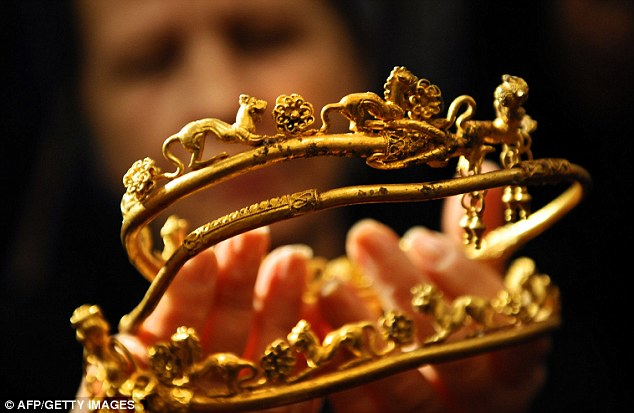Little is known about Philip’s
conquest of the land of the Getae in his early campaigns to stabilize Macedonia after
the death of his elder brother, King
Perdiccas III, in
359 BC.
Perdiccas was killed in a battle against the invading
Illyrians, after which Macedonia
faced several threats to the kingdom’s security. There was also the matter of
succession to the throne since the dead king’s son, Amyntas, was still a youngster. The Athenians
tried to interfere, pushing forward a certain Argaeus and the Thracians, Pausanias, who already
marched towards the capital city of Pella. Given all these threats, the Macedonian
Assembly unexpectedly proclaimed Philip as King, and the people swore their oath of allegiance to him.
It was a lengthy and challenging assignment for the young Philip. The most urgent
threat came from the Illyrians, who had just defeated his brother. He managed
some treaties which may have included his marriage to Audata, King Bardylis’ granddaughter.
He then turned towards the Paeonians, whom he corrupted with gifts and generous
promises to reach a peace agreement. Athens
with Argaeus was
another serious problem, and Philip
tricked them into believing he was giving up any claim on Amphipolis by
withdrawing his Macedonian soldiers. The Athenians took the bait and eventually
signed another peace treaty.
Macedonia suffered from relentless attacks on all sides,
but within a year, Philip managed to end the four major threats that had led to his accession to the
throne. The lightning speed of his actions paid off. Although peace was never
long-lived, Philip
cleverly manipulated his opponents using diplomacy, deceit, bribery, and
political marriages.
In 342/341 BC (see: Macedonia forged by Philip II – part 11), Philip successfully dislodged the Thracians in the
east, occupying the cities along the Hellespont
- a very sensitive area as he needed to control this inland route. Later that
year, he turned northwards against the people who lived between Thracia and the Danube
Valley. Their King Cothelas was quick to
surrender, giving his daughter, Meda,
in marriage to Philip
to become his sixth wife (see: The Many Wives of Philip II).
 Recent excavations have located the tomb of Cothelas in northeastern Bulgaria, near the modern village
of Sveshtari,
roughly 400 km
from the capital, Sofia. Although references to the Thracian
king remain vague, the largest tomb in that burial complex may very well be
his. Archaeologists have unearthed precious gold gifts, including 44
applications of female figures, 100 golden buttons, and a golden ring. The
pièce de résistance is a tiara with animal motifs and a horse headpiece.
Altogether, the site counts about 150 tombs all belonging to the Thracian
tribe, the Getae.
Recent excavations have located the tomb of Cothelas in northeastern Bulgaria, near the modern village
of Sveshtari,
roughly 400 km
from the capital, Sofia. Although references to the Thracian
king remain vague, the largest tomb in that burial complex may very well be
his. Archaeologists have unearthed precious gold gifts, including 44
applications of female figures, 100 golden buttons, and a golden ring. The
pièce de résistance is a tiara with animal motifs and a horse headpiece.
Altogether, the site counts about 150 tombs all belonging to the Thracian
tribe, the Getae.
Let’s hope that further excavations will reveal more about these
Thracians, of which much remains shrouded in mystery.
[Pictures from Daily Mail]



No comments:
Post a Comment